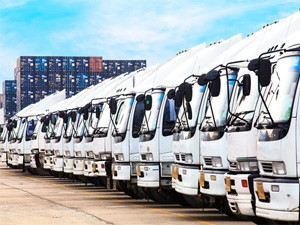
The rapid adoption of telematics for fleet management has left operators overwhelmed by the data they now have to deal with.
That's the view shared by local industry players, who point out the rapid evolution of the technology in SA and Africa has left fleet operators with many options when it comes to telematics.
A fleet telematics system allows the information exchange between a commercial vehicle fleet and its central authority.
Steven Sutherland, sales director at MiX Telematics for SA and Africa, says fleet managers are facing challenges in regards to telematics use.
"At the heart of this misunderstanding is the fact that fleet managers don't realise that advanced telematics, and the big data that can be derived from it, is more than just a device that spits out a whole lot of information.
"It's an end-to-end solution - implemented in close collaboration with your service provider - that makes continuous improvement possible."
Sutherland believes that that while obtaining fleet information may not be new, harnessing it at today's volumes and understanding what it means in the context of a fleet's operating environment is the challenge.
"As fleet owners move from merely tracking their vehicles and drivers to implementing a comprehensive solution, they'll soon realise huge benefits, including a significant reduction in fuel consumption and improved driver behaviour."
Shadab Rahil, MD of ICT solutions provider Paradigm Group, says with some telematics systems, too much data and notifications can become overwhelming for fleet managers and result in missing out on critical alerts.
According to Rahil, South African fleet managers' main challenges are costs and management of data. "It is very important for fleet managers to get the right data out of the system that is relevant to their business."
In recent times, he notes, telematics is being utilised for private drivers by some insurance companies. "Insurers are using this data to evaluate the risk a particular driver poses to the insurer's business. This has been one of the biggest new adoption of telematics."
For traditional commercial fleet managers, Rahil adds, some of the major benefits include improving vehicle utilisation, driver allocation, route management, accurate fuel monitoring, maintenance management, monitoring driver behaviour, speed monitoring, and idling.
"All these aspects collectively improve the ROI for commercial fleet operators. Telematics provides the most accurate way of capturing mileage and vehicle performance which increases the life of a vehicle and keeps drivers in check as well. Managing driver behaviour is one of the biggest challenges faced by fleet managers and using telematics is one way to manage it."
According to Sutherland, the use of 'big data' in telematics bodes well for businesses and fleet managers alike, as it allows them to track and monitor drivers, field workers, vehicles and other mobile assets such as forklifts.
"Effective mobile asset management takes care of your assets and monitors those who spend their days operating the equipment," he concludes.
Share